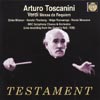Verdi Messa da Requiem
At last this legendary London performance receives its due.
View record and artist detailsRecord and Artist Details
Composer or Director: Giuseppe Verdi
Genre:
Vocal
Label: Testament
Magazine Review Date: 3/2005
Media Format: CD or Download
Media Runtime: 89
Mastering:
Mono
ADD
Catalogue Number: SBT21362

Tracks:
| Composition | Artist Credit |
|---|---|
| Messa da Requiem |
Giuseppe Verdi, Composer
Arturo Toscanini, Conductor BBC Symphony Chorus BBC Symphony Orchestra Giuseppe Verdi, Composer Helge Rosvaenge, Tenor Kerstin Thorborg, Mezzo soprano Nicola Moscona, Bass Zinka Milanov, Soprano |
Author: Alan Blyth
Writing recently in The Sunday Times, Davis Cairns aptly described this interpretation as ‘wonderfully stirring’. Previously available in execrable sound, Paul Baily for Testament has skilfully re-mastered the intractable BBC originals so that, though still confined and slightly distorted at climaxes, it is good enough to stand up to the 1940 Carnegie Hall version with the NBC Symphony and in certain respects surpass it. Both are superior to the more familiar and better recorded RCA version of 1951 simply because Toscanini gives the music more time to breathe. He imposes a unified and beseeching style on all his charges, impressing on them his own awe before Verdi’s score. The BBC Chorus respond with secure, clear-toned and large-scale singing, and the BBC Symphony, after four years working with the maestro, know exactly how he wants the music played, in this case lyrically, passionately and with an emphasis on a long line.
In his note to the set, the Toscanini specialist Harvey Sachs comments: ‘Every detail has been worked out to dovetail with every other detail; every segment of the work has a beginning, a climax and an ending’. Nothing has been left to chance, yet it all sounds spontaneous and inevitable – that is Toscanini’s genius. Here he seems at ease with himself and allows himself and his performers a flexibility that decreased as he aged.
Two of the soloists – Zinka Milanov and Nicola Moscona – appeared again in the New York performance, but both sound notably more relaxed here. With her famous pianissimo high notes and glowing tone, Milanov is well-nigh faultless (one missed entry apart). Moscona is sure and strong, but not particularly individual of utterance. Kerstin Thorborg, with her rich, spacious and stylishly impeccable singing, brings largesse and impassioned delivery to the mezzo role. Rosvaenge is not the equal of Björling in New York – who could be? – but his overtly romantic way with the music makes one forgive the occasional solecism and his idiosyncratic way with the Latin text. As a quartet, the voices blend well and the unaccompanied passages are, for once, sung in the quiet, prayerful way Verdi surely intended.
Most readers will want a recommendable modern set as a first choice, but this Toscanini version, once heard, will certainly be purchased as an adjunct. Especially as you get two CDs for the price of one.
In his note to the set, the Toscanini specialist Harvey Sachs comments: ‘Every detail has been worked out to dovetail with every other detail; every segment of the work has a beginning, a climax and an ending’. Nothing has been left to chance, yet it all sounds spontaneous and inevitable – that is Toscanini’s genius. Here he seems at ease with himself and allows himself and his performers a flexibility that decreased as he aged.
Two of the soloists – Zinka Milanov and Nicola Moscona – appeared again in the New York performance, but both sound notably more relaxed here. With her famous pianissimo high notes and glowing tone, Milanov is well-nigh faultless (one missed entry apart). Moscona is sure and strong, but not particularly individual of utterance. Kerstin Thorborg, with her rich, spacious and stylishly impeccable singing, brings largesse and impassioned delivery to the mezzo role. Rosvaenge is not the equal of Björling in New York – who could be? – but his overtly romantic way with the music makes one forgive the occasional solecism and his idiosyncratic way with the Latin text. As a quartet, the voices blend well and the unaccompanied passages are, for once, sung in the quiet, prayerful way Verdi surely intended.
Most readers will want a recommendable modern set as a first choice, but this Toscanini version, once heard, will certainly be purchased as an adjunct. Especially as you get two CDs for the price of one.
Discover the world's largest classical music catalogue with Presto Music.

Gramophone Digital Club
- Digital Edition
- Digital Archive
- Reviews Database
- Full website access
From £8.75 / month
Subscribe
Gramophone Full Club
- Print Edition
- Digital Edition
- Digital Archive
- Reviews Database
- Full website access
From £11.00 / month
Subscribe
If you are a library, university or other organisation that would be interested in an institutional subscription to Gramophone please click here for further information.




